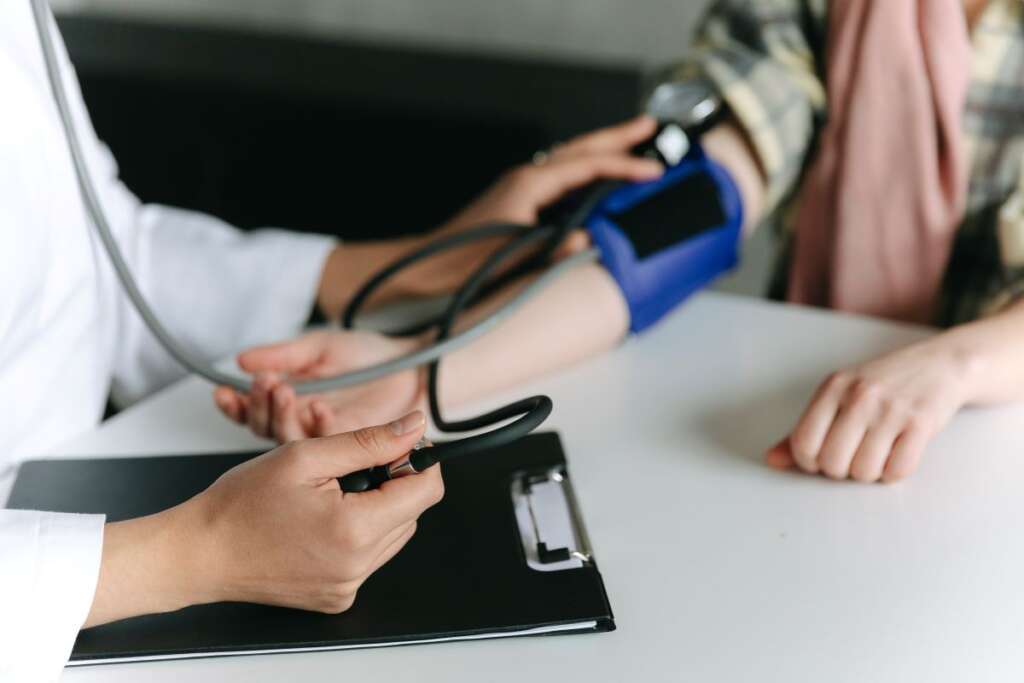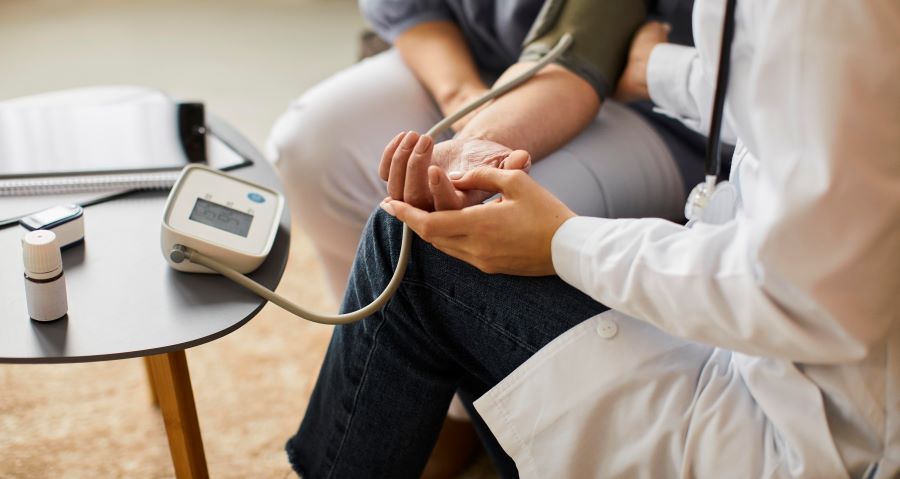
Every year, countless lives are affected by the silent threat of high blood pressure. Statistics reveal that high blood pressure is a leading cause of preventable deaths worldwide. But what exactly is blood pressure, and how do we measure it?
What is Blood Pressure?
Blood Pressure, often called the ‘Silent Killer,’ is a critical indicator of your heart’s health. It measures the force exerted by your heart as it pumps blood throughout your body. This measurement is expressed in millimetres of mercury (mmHg) and consists of two key figures:
- Systolic Pressure is when your heart contracts and pushes blood into your arteries.
- Diastolic Pressure is the Pressure in your arteries when your heart rests between beats, allowing it to refill with blood.
Imagine it as a rhythmic duo – Systolic as the active force and Diastolic as the calm in between.
When you encounter these figures on the Blood Pressure monitor, such as ‘140 over 90’ or 140/90 mmHg, your Systolic Pressure is 140 mmHg, and your Diastolic Pressure is 90 mmHg. These numbers hold the key to understanding your cardiovascular health.
Ideal Blood Pressure
So, what’s the ideal Blood Pressure? Your Blood Pressure should fall between 90/60 mmHg and 120/80 mmHg. This range signals a heart working harmoniously to keep you in good health.
What is Normal Blood Pressure by Age?
As a general guide:
- high blood pressure is considered to be from 140/90mmHg or more if your reading was taken at a GP surgery or clinic (or an average of 135/85mmHg if it was taken at home)
- If you’re over the age of 80, high blood pressure is considered to be from 150/90mmHg or more if your reading was taken at a GP surgery or clinic (or an average of 145/85mmHg if it was taken at home)
- Ideal blood pressure is usually considered to be between 90/60mmHg and 120/80mmHg, while the target for people over the age of 80 years old is below 150/90mmHg (or 145/85mmHg if it was taken at home)
Signs of High Blood Pressure
However, the alarm bells ring when the numbers climb, especially when reaching 140/90 mmHg or higher. High Blood Pressure can be a red flag. Your chances of heart disease, stroke, and other serious health issues are higher.
Does lemon water lower blood pressure?
Since lemon drinks have calcium and potassium, they are generally believed to lower High Blood Pressure. However, research has yet to prove it.
Signs of Low Blood Pressure
On the flip side, if your Blood Pressure dips below 90/60 mmHg, you may be dealing with Low Blood Pressure. While this isn’t always a cause for concern, it can cause dizziness, fainting, and other symptoms that affect your well-being. The reason for concern will depend on the cause, like heart failure or dehydration is the underlying cause.
Understanding your Blood Pressure is like having a guide to better health. So, whether it’s a quest for the ideal range or a need to manage High or Low Pressure, your journey begins with knowing those two crucial numbers – Systolic and Diastolic Pressure.”
How to ease low blood pressure symptoms yourself?
You can do things to help with symptoms of low blood pressure.
The Dos
Get up slowly from sitting to standing
Take care when getting out of bed – move slowly from lying to sitting to standing.
Eat small, frequent meals – lying down or sitting still for a while after eating may also help.
Increase the amount of water you drink.
The don’t dos
Do not sit or stand for long periods
Do not bend down or change posture suddenly.
Do not drink too much alcohol.
What causes High Blood Pressure?
High Blood Pressure, or Hypertension, has complex causes that include:
- Smoking: Smoking can affect your blood vessels and elevate Blood Pressure.
- Weight: Being overweight or obese strains your heart and arteries, raising Blood Pressure.
- Physical Inactivity: A lack of exercise can contribute to hypertension.
- High Sodium Diet: Excessive salt intake can lead to water retention and increased Blood Pressure.
- Alcohol: Consuming more than 1 to 2 drinks daily can raise Blood Pressure.
- Stress: Prolonged stress can elevate Blood Pressure.
- Ageing: As you age, artery flexibility decreases, potentially increasing Blood Pressure.
- Genetics and Family History: If your family has a history of High Blood Pressure, you may be at higher risk.
- Kidney Issues: Chronic Kidney Disease can disrupt blood pressure regulation.
- Adrenal and Thyroid Problems: Disorders in these glands can impact hormone balance and Blood Pressure.
Sleep Apnea: This condition, marked by breathing interruptions during sleep, can contribute to hypertension if untreated.
How do you feel when your Blood Pressure is high?
Some might feel a pounding in their head or chest, dizziness, or other signs. But many don’t have symptoms and could go years without realizing they have it.
Understanding these factors helps manage and prevent High Blood Pressure, promoting heart health.
Fallouts of Uncontrolled High Blood Pressure
High Blood Pressure packs a serious punch to your health:
- Heart Attack and Stroke Risk: Damaged arteries can cause blood clots, triggering heart attacks or strokes.
- Heart Failure Risk: Overworking your heart due to narrowed arteries can lead to heart failure.
- Chest Pain (Angina): Reduced blood flow can cause angina during physical activities.
- Kidney Damage: High blood pressure harms kidney arteries, potentially causing kidney failure.
- Vision Problems: It strains eye blood vessels and can lead to vision loss.
- Sexual Dysfunction: Men and women can face libido and erectile issues.
- Peripheral Artery Disease (PAD): Narrowed arteries in limbs and head cause pain and raise heart attack risk.
- Hypertensive Crisis: Rapid, dangerous Blood Pressure spikes can damage organs and result in symptoms like blurry vision, severe headaches, and chest discomfort.
Take High Blood Pressure seriously; manage it through lifestyle changes and medical guidance to protect your health.
When to see a Doctor
Consider booking an appointment with a cardiologist if:
- Your High Blood Pressure remains uncontrolled despite lifestyle adjustments.
- There’s a family history of heart disease or heart attacks.
- You have elevated cholesterol levels or diabetes.
- You’re encountering symptoms like leg or foot swelling, shortness of breath, irregular heartbeats, headaches, or lightheadedness, which could indicate other heart-related issues.
Heart health is a priority; a cardiologist can provide the expertise and guidance you need for a healthier life.
What causes Low Blood Pressure?
Hypotension, or Low Blood Pressure, can occur for various reasons:
- Orthostatic Hypotension: Quick changes in posture, like standing up suddenly, can lead to a temporary drop in Blood Pressure.
- Central Nervous System Diseases: Conditions such as Parkinson’s disease can affect Blood Pressure regulation, and after meals, the digestive process may demand more blood flow.
- Low Blood Volume: Severe injuries causing blood loss and dehydration can result in Low Blood Pressure.
- Life-Threatening Conditions: Serious issues like irregular heart rhythms, pulmonary embolism, heart attacks, collapsed lungs, severe allergic reactions, or infections can cause a dangerous drop in Blood Pressure.
- Heart and Lung Conditions: Abnormal heart rhythms, weakened heart muscles, or lung problems can contribute to Low Blood Pressure.
- Prescription Medications: Certain medications, even those for hypertension, can sometimes Low Blood Pressure. Never consume medicines without consulting your healthcare provider.
- Alcohol or Recreational Drugs: Alcohol and recreational drugs can briefly decrease Blood Pressure, as can some herbal supplements and remedies. Always inform your healthcare provider about all substances you’re using.
- Pregnancy: Expectant mothers can experience orthostatic Hypotension, particularly in the early and middle stages of pregnancy. Complications like bleeding during pregnancy may also lead to Low Blood Pressure.
- Extreme Temperatures: High heat and cold can aggravate Low Blood Pressure symptoms. Understanding these potential causes can aid in identifying and managing this condition effectively.
What if my Blood Pressure is 80- 60?
In adults, what’s considered a typical Blood Pressure falls under 120/80 mmHg. When readings dip below 90/60 mmHg, it’s classified as Low Blood Pressure. Hypotension frequently arises when the body faces difficulty in promptly restoring Blood Pressure to its normal range. However, for certain individuals, having Low Blood Pressure is their baseline condition.
Fallouts of Uncontrolled Low Blood Pressure
Severe Hypotension can escalate into a condition known as Hypotensive Shock, and there are various types depending on the underlying cause:
- Hypovolemic Shock occurs when your total blood volume drops significantly, hampering your heart’s ability to pump effectively. It can result from severe internal or external bleeding or extreme dehydration.
- Cardiogenic Shock: Here, the heart struggles to function correctly due to cardiovascular issues. Symptoms may include a slow heart rate and cool, dry skin on the extremities.
- Distributive Shock: This happens when the body’s vascular system loses resistance, and the heart can’t pump blood fast enough to compensate. Allergic reactions (anaphylactic Shock) and septic Shock, a potential complication of infections, fall into this category.
- Obstructive Shock: In this scenario, an obstruction in the cardiovascular system disrupts effective heart pumping or blood flow. Pulmonary embolism is a common cause. Signs might include swollen jugular veins and subdued heart sounds.
When these factors combine, it’s referred to as hypotensive Shock. Regardless of the cause, it’s a critical medical emergency requiring immediate attention.
When to see a doctor
If your Blood Pressure takes a sudden nosedive or you experience unusual symptoms like frequent urination, fever, or fatigue, seek medical advice.
When Blood Pressure plunges to deficient levels, there’s a risk of inadequate blood and oxygen supply to vital organs, especially the brain.
In such cases, seeking emergency medical attention is crucial.
In situations where someone displays signs of anaphylaxis, immediate action is vital.
If an individual has an autoinjector, anyone nearby can help administer it swiftly. Prioritizing safety is crucial.
Conclusion
Taking control of your Blood Pressure is within your grasp, and it starts with simple yet powerful lifestyle choices. Firstly, get moving – regular physical activity lowers Blood Pressure and boosts your mood, strength, and balance.
If you’re new to exercising, it’s essential to consult with your doctor for a safe beginning. Additionally, consider adopting the DASH diet, which emphasizes various fruits, vegetables, whole grains, lean proteins, and low-fat dairy while minimizing saturated fats, sweets, and sodium intake.
Thirdly, limit your salt intake to 1,500 to 2,300 milligrams daily and read food labels for hidden sodium. Fourthly, maintain a moderate weight and watch your waistline; shedding just a few pounds can make a difference.
If you smoke, it’s time to quit – every cigarette raises your Blood Pressure. Finally, enjoy alcohol in moderation and find ways to manage stress in today’s busy world. These steps are your path to a healthier heart and a better quality of life. Take action today for a happier, healthier tomorrow!
For further useful health tips please visit and subscribe to my YouTube channel.
References:
https://www.nhs.uk/common-health-questions/lifestyle/what-is-blood-pressure/
https://www.verywellhealth.com/average-blood-pressure-by-age-5085328
https://www.webmd.com/hypertension-high-blood-pressure/blood-pressure-causes
https://www.upmc.com/services/south-central-pa/heart-vascular/heart/high-blood-pressure.
https://healthmatch.io/high-blood-pressure/when-to-see-a-cardiologist-for-high-blood-pressure#when-should-you-see-a-cardiologist-about-high-blood-pressure.
https://my.clevelandclinic.org/health/diseases/21156-low-blood-pressure-hypotension
https://www.medicalnewstoday.com/articles/159609#hypotension-and-shock.
https://www.healthline.com/health/high-blood-pressure-home-remedies#reduce-stress.
Disclaimer: The Content on this channel is for educational purposes and not intended to be a substitute for professional medical advice, diagnosis, or treatment. Always get advice from your doctor if you are worried or have symptoms



6 Comment(s)
by Raymon
Hmm it appears like your site ate my first comment (it was extremely long) so I guess
I’ll just sum it up what I submitted and say, I’m thoroughly enjoying
your blog. I as well am an aspiring blog blogger
but I’m still new to everything. Do you have any
recommendations for rookie blog writers? I’d definitely appreciate it.